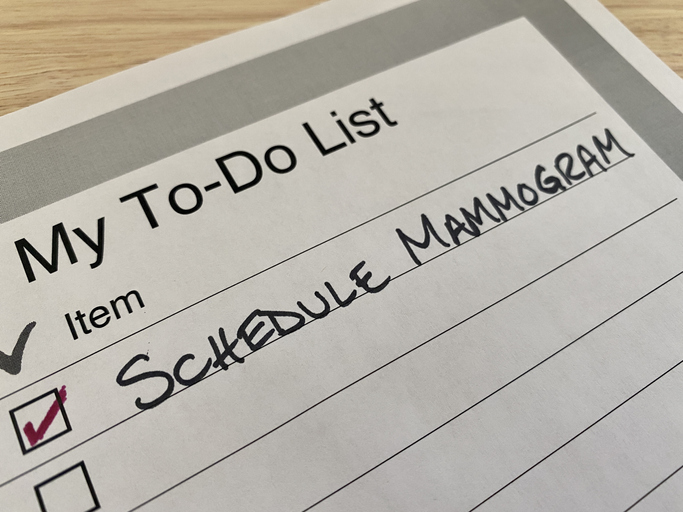It isn’t always easy to stop and take time for self-care. You might try to pencil it in, but something always seems to come up.
Try as we might, good health practices tend to be neglected, especially regarding preventive health screenings like mammograms. All too often, this vital exam is pushed to the back burner.
Research shows that one in four women who should be getting regular mammograms don’t.
Breast Cancer Screening: What to Expect
A mammogram is an x-ray of the breast, and it can spot slight abnormalities in the breast that may be breast cancer – even if the patient shows no cancer symptoms.
Women with an average risk for breast cancer should begin mammogram screening every year starting at 40. A screening mammogram takes about 20 minutes and exposes you to less radiation than a standard chest x-ray. During the mammogram, your breast will be compressed briefly, but the technologists try to work quickly and take all possible measures to minimize discomfort. A radiologist then reviews these images for anything that may be out of the ordinary or could be a cause for concern. If any suspicious areas are detected, your healthcare provider will follow up with recommendations for additional testing.
If the screening picks up a suspicious area, it does not automatically mean you have cancer. You may have more detailed testing, such as a breast ultrasound, diagnostic mammogram, or breast MRI. In some cases, a biopsy may be performed to make the most accurate diagnosis possible.
What are Some Signs and Symptoms of Breast Cancer?
Not all changes to the breast mean you have cancer. Quite often, it’s something very minor. However, you should talk to your doctor if you notice any of these signs:
- New lump located in the armpit or breast
- Dimpling of breast skin
- Pain in the nipple area
- Any change in the shape or size of the breast
- Irritation of breast skin
- The nipple pulls in
- Swelling or thickening of part of the breast
- Flaky skin or redness in the breast or nipple area
- Any discharge (such as clear fluid or blood) from the nipple except for breast milk
- Pain in any part of the breast
Doctors also advise a monthly breast self-exam. This will allow you to learn how your breasts usually feel, making it easier for you to detect small changes. If you don’t know how to give yourself a self-breast exam, talk to your doctor, or follow this link to learn how. It is a powerful second line of early detection.
Breast Cancer Risk Factors
Early detection is critical in breast cancer cases. When caught early, the odds of a favorable outcome are often significantly raised.
Women with a 20% to 25% or greater lifetime risk for breast cancer due to genetic tendency or a family history of breast cancer should get a yearly mammogram and a breast MRI starting at 30. Other risk factors may put women in this category. Women who carry a known gene mutation for BRCA1 or BRCA2 or have a parent, child, sister, brother, or another first-degree relative with the gene mutation BRCA1 or BRCA2 should also get a mammogram annually. A woman who has undergone radiation therapy in the chest area at any point between the ages of 10 years old and 30 years old also falls in this category.
There’s Only One You, So Take Care of Yourself
The truth is that when you start neglecting your own needs, especially regarding your health, it is usually an indication that you have exceeded your capacity, and it’s time to take a step back and slow down. At Intermountain Medical Imaging, you are our priority.
Let us help you get back on track with your health care by making it as convenient and comfortable as possible. With a patient net promotor score (or NPS) of 87, IMI is in the top percentile for patient satisfaction. We work hard to minimize your wait time in comfortable waiting rooms and with helpful, compassionate staff.
Everyone was amazing from the moment I walked through the doors. The technician was fabulous, informative, gentle, and kind. It was such an easy process getting in and out. I love that they have separate rooms for you to undress and gown up in.
– satisfied screening mammogram patient
Let us help you put yourself first. Call or request your appointment online today to schedule your mammogram. You’re worth it.
